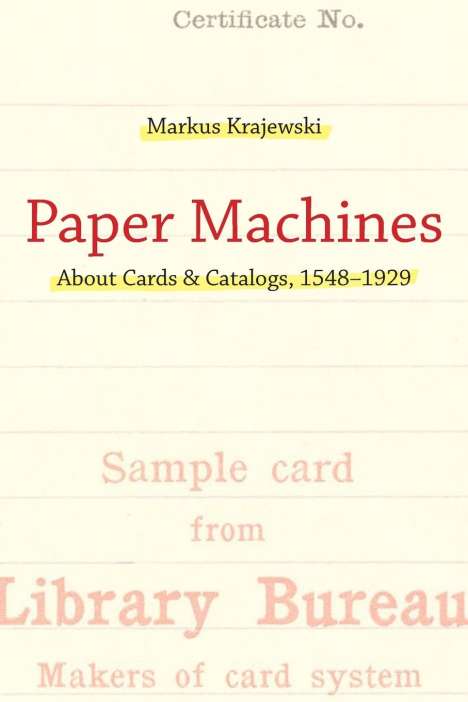Markus Krajewski: Paper Machines
Paper Machines
Buch
- About Cards & Catalogs, 1548-1929
lieferbar innerhalb 2-3 Wochen
(soweit verfügbar beim Lieferanten)
(soweit verfügbar beim Lieferanten)
EUR 47,49*
Verlängerter Rückgabezeitraum bis 31. Januar 2025
Alle zur Rückgabe berechtigten Produkte, die zwischen dem 1. bis 31. Dezember 2024 gekauft wurden, können bis zum 31. Januar 2025 zurückgegeben werden.
- MIT Press, 12/2023
- Einband: Kartoniert / Broschiert, Paperback
- Sprache: Englisch
- ISBN-13: 9780262550857
- Bestellnummer: 11719732
- Umfang: 222 Seiten
- Gewicht: 368 g
- Maße: 229 x 152 mm
- Stärke: 13 mm
- Erscheinungstermin: 26.12.2023
Achtung: Artikel ist nicht in deutscher Sprache!
Klappentext
Why the card catalog--a "paper machine" with rearrangeable elements--can be regarded as a precursor of the computer.Today on almost every desk in every office sits a computer. Eighty years ago, desktops were equipped with a nonelectronic data processing machine: a card file. In Paper Machines, Markus Krajewski traces the evolution of this proto-computer of rearrangeable parts (file cards) that became ubiquitous in offices between the world wars.
The story begins with Konrad Gessner, a sixteenth-century Swiss polymath who described a new method of processing data: to cut up a sheet of handwritten notes into slips of paper, with one fact or topic per slip, and arrange as desired. In the late eighteenth century, the card catalog became the librarian's answer to the threat of information overload. Then, at the turn of the twentieth century, business adopted the technology of the card catalog as a bookkeeping tool. Krajewski explores this conceptual development and casts the card file as a "universal paper machine" that accomplishes the basic operations of Turing's universal discrete machine: storing, processing, and transferring data. In telling his story, Krajewski takes the reader on a number of illuminating detours, telling us, for example, that the card catalog and the numbered street address emerged at the same time in the same city (Vienna), and that Harvard University's home-grown cataloging system grew out of a librarian's laziness; and that Melvil Dewey (originator of the Dewey Decimal System) helped bring about the technology transfer of card files to business.
Biografie
Markus Krajewski ist tätig als wissenschaftlicher Mitarbeiter am Lehrstuhl für Geschichte und Theorie der Kulturtechniken an der Bauhaus-Universität Weimar. Hauptforschungsgebiete: Weltprojekte und Diskurse der Effizienz um 1900.
Markus Krajewski
Paper Machines
EUR 47,49*

